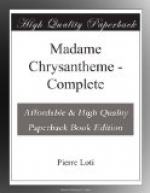In a side temple near the entrance is enthroned a colossal Buddha seated in his lotus—a gilded idol from forty-five to sixty feet high, mounted on an enormous bronze pedestal.
At length appears the last doorway with the two traditional giants, guardians of the sacred court, which stand the one on the right hand, the other on the left, shut up like wild beasts, each in an iron cage. They are in attitudes of fury, with fists upraised as if to strike, and features atrociously fierce and distorted. Their bodies are covered with bullets of crumbled paper, which have been aimed at them through the bars, and which have stuck to their monstrous limbs, producing an appearance of white leprosy: this is the manner in which the faithful strive to appease them, by conveying to them their prayers written upon delicate leaflets by the pious bonzes.
Passing between these alarming scarecrows, one reaches the innermost court. The residence of our friends is on the right, the great hall of the pagoda is before us.
In this paved court are bronze torch-holders as high as turrets. Here, too, stand, and have stood for centuries, cyca palms with fresh, green plumes, their numerous stalks curving with a heavy symmetry, like the branches of massive candelabra. The temple, which is open along its entire length, is dark and mysterious, with touches of gilding in distant corners melting away into the gloom. In the very remotest part are seated idols, and from outside one can vaguely see their clasped hands and air of rapt mysticism; in front are the altars, loaded with marvellous vases in metalwork, whence spring graceful clusters of gold and silver lotus. From the very entrance one is greeted by the sweet odor of the incense-sticks unceasingly burned by the priests before the gods.
To penetrate into the dwelling of our friends the bonzes, which is situated on the right side as you enter, is by no means an easy matter.
A monster of the fish tribe, but having claws and horns, is hung over their door by iron chains; at the least breath of wind he swings creakingly. We pass beneath him and enter the first vast and lofty hall, dimly lighted, in the corners of which gleam gilded idols, bells, and incomprehensible objects of religious use.
Quaint little creatures, choir-boys or pupils, come forward with a doubtful welcome to ask what is wanted.
“Matsou-San!! Dondta-San!!” they repeat, much astonished, when they understand to whom we wish to be conducted. Oh! no, impossible, they can not be seen; they are resting or are in contemplation. “Orimas! Orimas!” say they, clasping their hands and sketching a genuflection or two to make us understand better. ("They are at prayer! the most profound prayer!”)
We insist, speak more imperatively; even slip off our shoes like people determined to take no refusal.




